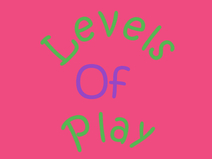
The following are play levels of social interaction that children go through over time. Each level requires more communication and language skills than the one before. Through play, a child develops language skills, physical skills, emotional skills, social skills, and cognitive skills.
Solitary Play
This level of play is also known as independent play. The child plays by himself and does not intend to play with anyone else.
Spectator Play
This level of play is also known as onlooker play. The child watches other children play but does not engage in play himself. This is when children learn to observe others. This play level can show a child’s attention and awareness skills.
Parallel play
In this level of play, children play side by side but do not communicate with each other or share toys. The child is playing ‘beside’ rather than ‘with’ the other kids who are near him. A child is in this stage when he can play alone, but the activity he is doing is similar to the activity that other children next to him are doing.
Associative Play
In this level of play, there is no organizational structure. Children still play independently but share toys and other items that they are playing with. This level shows the child’s awareness of other children, although there is no direct communication between them other than sharing of toys.
Cooperative Play
This is the final stage of play and is organized. Children are already playing together, sharing toys, and communicating with each other. Children participate in group games and other highly structured play activities.
As a toddler speech therapist, parents sometimes ask me, "My toddler doesn't play with other children (at daycare, school, church, etc.). Is this normal?" Hopefully the stages of play can help you understand why. During the toddler years you'll find your child playing by himself (solitary play), playing alongside another toddler (parallel play), or playing alone but sharing toys with their friends (associative play). You should see your toddler progressing through these stages until he can begin to play with other children his age in an organized way while communicating with them and sharing toys. This level of play will probably come after the toddler years.
If you have concerns that your toddler is not progressing through these play stages, you should talk to your pediatrician or a speech-language pathologist for tips to help your toddler. These professionals may suggest an evaluation to determine other factors and needs concerning the development of your child.
To learn why play is so important be sure to read The Power of Play-The Best Way to Teach Your Toddler to Talk. To learn how to play with your toddler, check out The Power of Play-How to Play With Your Child to Boost Toddler Speech Skills.

 RSS Feed
RSS Feed



